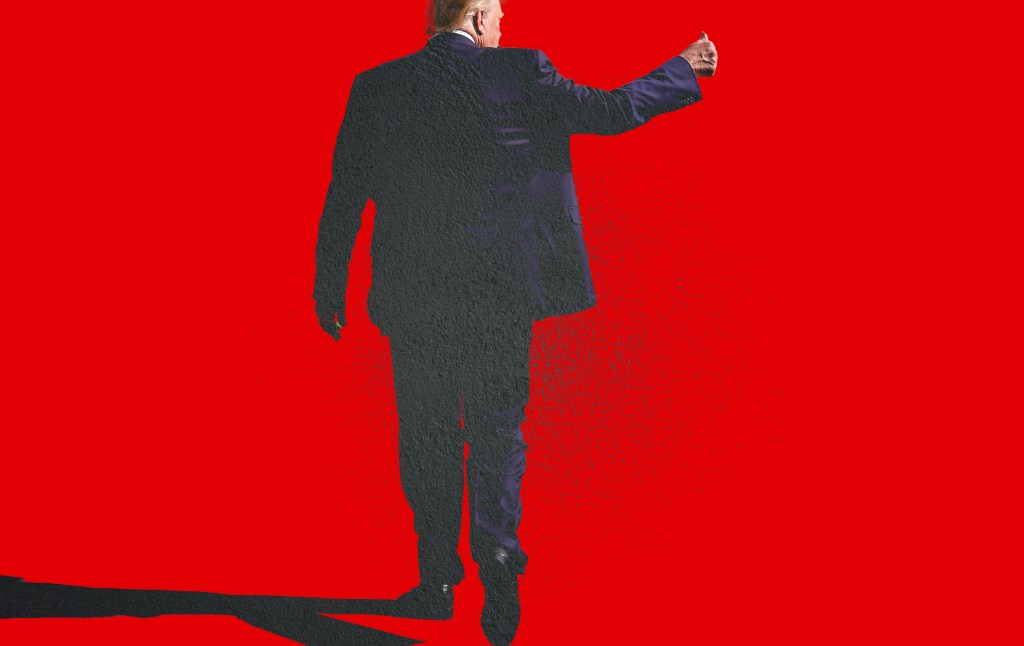
The competition for Donald Trump’s endorsement in key Republican primaries has evolved into a distinct, methodical process that candidates prioritize higher than wooing voters, befitting the president’s remarkable influence in GOP nominating contests.
Republican primary voters often rank loyalty to Trump higher than fidelity to conservative principles, a dynamic that predates the president’s second term but that has solidified since his return to the White House. With the 2026 midterm primary season fast approaching, Republican strategists are responding accordingly. Party operatives advising candidates for gubernatorial and congressional races have built campaigns to run on twin tracks: Win Trump’s endorsement, and win over voters—typically in that order.
“Step 1 is acknowledging Trump’s endorsement is the most powerful thing in a Republican primary. It’s literally worth millions of dollars,” a veteran Republican consultant told The Dispatch, requesting anonymity to discuss the president and strategies being employed to secure his support in upcoming GOP primaries. Republican Senate candidates who have scored Trump’s endorsement, avoiding the need to raise and spend millions seeking the nomination, include former Rep. Mike Rogers in Michigan and Rep. Ashley Hinson in Iowa.
Trump is a mercurial politician, prone to seeking counsel from multiple sources, and changing his mind repeatedly before making a decision. He enjoys being feted—and chased—so at times he’ll leave his endorsement on the table for the pleasure of watching candidates fight over who deserves it. His intervention in party primaries, unprecedented compared to past presidents, is ultimately subjective. And yet a surprisingly deliberate, consensus process of best practices regarding how to win his endorsement has emerged.
That process generally begins with opposition research—not so much to uncover an opponent’s bad behavior or political weaknesses on core conservative issues, but to (hopefully) discover past criticism of Trump, whether public or private. Although the president can forgive apostates their trespasses—see Vice President J.D. Vance—he prizes personal fidelity. That can give a candidate with an unblemished record of Trump loyalty a considerable advantage over a more opportunistic supporter, let alone a principled critic.
Next is what Republican strategists described to The Dispatch as “information flow.”
Obtaining the support of wealthy GOP megadonors capable of getting Trump on the telephone is among the best ways for candidates to create and maintain a positive flow of information about their campaigns. Having relationships with operatives, lawmakers, and activists who have connections to Trump and can vouch for a candidate is certainly a plus.
Yet another is to hire consultants who have close relationships with the president, especially pollster Tony Fabrizio and strategist Chris LaCivita, who co-managed Trump’s 2024 comeback.
Taking these steps can additionally demonstrate “connectivity” with officials in Trump world, supporters in the MAGA movement, or both. “You figure out who the president is listening to and then you want to pump information to these people,” said a Republican insider who has witnessed the process firsthand. Meanwhile, Trump shares at least one similarity with past presidents: He’s attracted to candidates who show political potential—those with strong fundraising, encouraging poll numbers, and high name identification in particular.
Perhaps unlike past presidents, Trump is obsessed with physical beauty and charisma, telegenic qualities he likens to being plucked from “central casting” for a television show or movie.
“What does the president like more than anything? Winning, demonstrating strength,” said a Republican operative who has shepherded candidates through this process. “You have to make sure your appearance is good, that you’re well dressed, that you carry yourself well. All those things matter. He likes presentation. Are you good on TV? That matters.” (And if so, appearing on Fox News Channel regularly to promote and defend Trump is how candidates prove themselves to him directly. It’s at least as important as meeting voters on the campaign trail.)
Presidents, via the White House political affairs team, have always been involved in their party’s campaign activities, including the vetting and approval of candidates. But most presidents have not been as personally central to the process as Trump, usually deferring to their party’s respective congressional campaign committees. And the White House political ship is more disciplined and structured this time around. That’s a product of being overseen by White House Chief of Staff Susie Wiles, a political strategist and experienced campaign manager by trade, sources tell The Dispatch.
But it’s also due to the know-how of a political team led by alumni of the 2024 campaign, including White House Deputy Chief of Staff for Political Affairs James Blair, and White House Political Director Matthew Brasseaux.
For candidates without a preexisting connection to Trump, vetting for a possible endorsement often begins by meeting with top officials of the White House political operation. As The Dispatch previously reported, rather than defer to the GOP congressional campaign committees—the National Republican Congressional Committee and the National Republican Senatorial Committee—Trump’s outside political operation is raising hundreds of millions of dollars, with the White House insisting on signing off on most candidates.
“Susie directs everything,” a Republican congressional aide said. “She is very involved.”
















